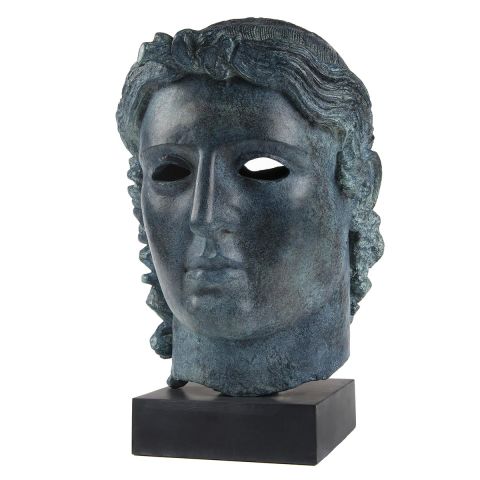KipArtGifts | Gifts of Art
Apollo - Chatsworth Bronze Head - Ancient Greek Mythology
Couldn't load pickup availability
A bronze replica of the Chatsworth head of Apollo.
Crafted in the United Kingdom, this exceptional bronze sculpture has been cast from the original head once owned by the Duke of Devonshire. This artifact, now known as the Chatsworth Apollo, was part of the renowned collection at Chatsworth House, which bestowed upon it its modern name. Originally, this head was a component of a full-length statue discovered in Tamassos, Cyprus, in 1836. Dating back to 470-460 BCE, this piece is one of the rare surviving bronze sculptures from this era, marking it as a significant relic of historical and artistic value.
The head represents the ancient Greek god Apollo, the son of Zeus and Leto, and the twin brother of Artemis. Apollo was revered as the god of music, poetry, and the sun. The primary center of his worship was located at Delphi, a site famed for its oracle. Apollo was believed to protect the oracle and, on occasion, endow others with the gift of prophecy. This connection to divination underscores his importance in ancient Greek religion and culture.
The survival of this bronze head through the centuries is a testament to the craftsmanship of ancient Greek sculptors and the reverence held for Apollo. The discovery at Tamassos provides insight into the spread of Greek art and religion to Cyprus, emphasizing the cultural exchanges of the period. This sculpture is not merely a piece of art but a valuable historical document that offers a glimpse into the religious and artistic practices of ancient Greece.
Preserving such artifacts in collections like Chatsworth House ensures that these links to our past remain accessible for future generations. The Chatsworth Apollo stands as a symbol of the enduring legacy of Greek civilization, reflecting its influence on art, culture, and religious practices that continue to resonate through history.
An astonishing ornament celebrating an unknown yet masterful ancient sculptor.
Share

